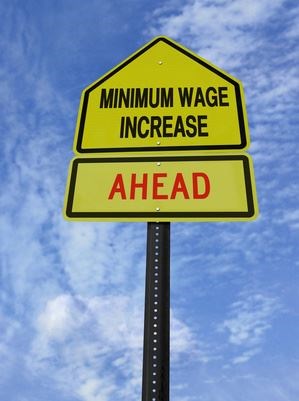From April 2023 the minimum wage rates will rise so employers need to check that their employees are being paid at least the minimum wage rate for their age based on the number of hours they work.
The new rates from April 2023 are:
| National Living Wage (23+) | £10.42 per hour | Increase of 92p per hour |
| Employees Aged 21-22 | £10.18 per hour | Increase of £1 per hour |
| Employees Aged 18-20 | £7.49 per hour | Increase of 66p per hour |
| Employees Aged 16-17 & Apprentices | £5.28 per hour | Increase of 47p per hour |
Employers must ensure they are calculating employees pay correctly to meet the required rates if they are not paid by the hour. This can be done by calculating the number of hours worked during the pay period (weekly, fortnightly, four weekly or monthly) and dividing the gross pay for the period by the number of hours worked. This gives an average hourly rate which must be at or above the minimum level for their age. Any enhanced overtime rate must be deducted before making this calculation as it does not count towards the minimum wage rate.
The new rates apply from the first day of the pay period after 1st April. For monthly paid employees this is likely to be 1st April, however for weekly paid this may be a date within the first week of April.
All calculations must be done before the deduction of tax, NI and pension contributions.
There are certain situations to be careful of when calculating whether an employee is receiving the minimum wage.
Charging employees for accommodation
Every year the accommodation offset rate increases alongside the minimum wage rates. This rate is the maximum you can charge an employee for their live-in accommodation without it affecting the minimum wage calculation.
If you charge an employee more than the offset rate for the year you will need to deduct the difference between the offset rate and the rate you charge, deduct this from the employees' gross pay and then calculate whether they are being paid the minimum wage rate for their age based on the number of hours they have worked during the pay period.
The accommodation charge can reduce an employees' pay significantly if they have unpaid time off for sickness absence for example and their pay may need to be made up to ensure they receive the minimum wage rate. In these circumstances their gross pay will be divided by the number of hours worked and the number of hours absent will be excluded.
For more information visit HMRC guidance on Calculating Minimum Pay.
Charging employees for a service
If an employee pays their employer for a service and this payment is deducted from their wages this reduces their pay and could take them below the National Minimum wage. If the employee pays for this service separately from their pay, from their own bank account for example, it doesn't reduce the pay below the minimum wage.
For further information from HMRC about Calculating Minimum Wage
Other payments which must not be included when calculating a worker's pay
- Reimbursed expenses
- Tips
- Enhanced overtime rates
- Loans
Deductions from pay
Any payments deducted from an employees' pay must be taken into account when ensuring your employee is receiving the minimum wage rate for their age. For example if an employee is expected to repay you for training completed this deduction is taken off gross pay before calculating average hourly rate.
The exceptions to this are
- Tax and National Insurance
- Pension contributions
- Student Loan
- Advance of pay
- Recovery of an accidental overpayment of wages
Summary
It is important for all employers who pay their employees at or above the National Minimum Wage that they check that they are paying the correct rate and that any additional deductions from their pay do not reduce their pay to below the National Minimum Wage for the hours they have worked during the pay period.
It is a criminal offence not to pay a worker or employee the minimum wage rate for their age. HMRC can carry out checks and ask to see your records and will investigate an employer if an employee complains.

